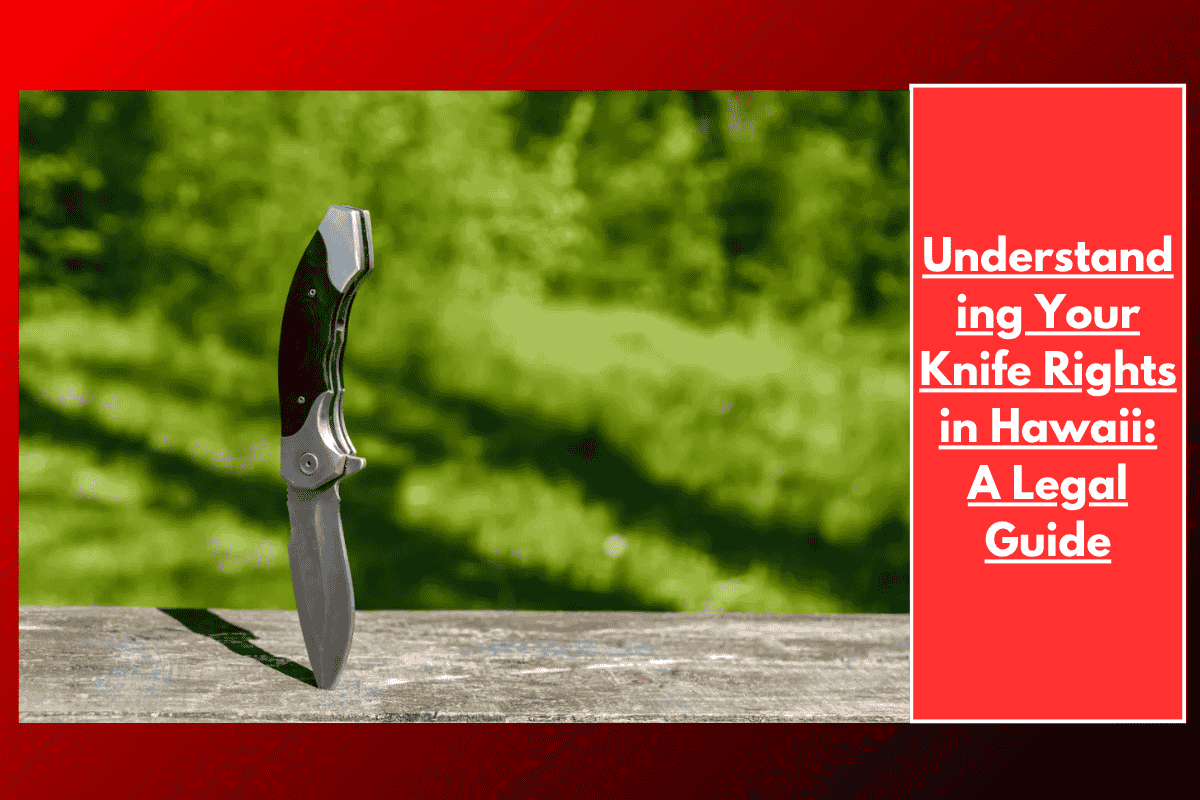Hawaii, with its unique cultural history and laws, has specific regulations governing the ownership, carrying, and use of knives. Whether you are a local resident or a visitor, understanding the legal landscape of knife ownership in Hawaii is essential to avoid legal troubles. In this guide, we’ll walk you through Hawaii’s knife laws, including what knives are legal to own, how they can be carried, and the circumstances under which they can be used.
Hawaii Knife Laws: An Overview
Hawaii law regulates knives under several sections of its state statutes. Unlike many states, Hawaii has more restrictive laws when it comes to the open carry of knives, and this can affect both residents and tourists. In Hawaii, knives are considered dangerous weapons, and their possession, carrying, and use are closely controlled.
The relevant legal sections for knives in Hawaii are typically found under Hawaii Revised Statutes (HRS) § 134-51 and HRS § 708-836, which address both ownership and criminal possession of dangerous weapons.
What Knives Are Legal in Hawaii?
In Hawaii, most types of knives are legal to own, but there are restrictions on how they can be carried and used. Here’s an overview of the types of knives and their legality:
- Folding Knives:
Folding knives are legal to own and carry in Hawaii as long as they are not used in a manner that could be considered threatening or dangerous. These knives, often referred to as pocket knives, are legal to carry for personal use, such as for camping, hiking, or everyday tasks. - Fixed-Blade Knives:
Fixed-blade knives, which have a blade that does not fold, are also legal to own in Hawaii. However, like folding knives, their use is regulated. Carrying them in public may be subject to additional restrictions, especially if they are concealed. - Bowie Knives and Other Large Knives:
Large knives like bowie knives and machetes are legal to own, but they are highly restricted in how they can be carried. Carrying these large knives in public may raise suspicion, and if they are carried in a manner that could be seen as threatening, it could lead to criminal charges. - Switchblades and Automatic Knives:
Switchblade knives (knives with a blade that opens automatically when a button or switch is pressed) and automatic knives are illegal to carry in Hawaii. Under Hawaii’s knife laws, it is a criminal offense to possess, manufacture, sell, or carry these types of knives. While owning a switchblade may be allowed in some circumstances, carrying it in public is strictly prohibited. - Gravity Knives:
Similar to switchblades, gravity knives are illegal in Hawaii. These knives open by gravity or centrifugal force, making them fall under the same legal restrictions as switchblades and automatic knives. - Dirks and Daggers:
Dirks (long, pointed knives) and daggers (double-edged knives) are also legal to own but face restrictions on carry. Carrying a dirk or dagger in public could result in criminal charges, especially if it is concealed or carried in a threatening manner.
How Can You Legally Carry a Knife in Hawaii?
Hawaii has specific rules governing how knives can be carried in public. Generally, you can legally carry a knife if you follow these guidelines:
- Open Carry:
Open carrying of a knife is allowed in Hawaii if it is for lawful purposes, such as fishing, camping, or work-related tasks. However, it’s important that the knife is not carried in a manner that could be perceived as threatening to others. For example, openly carrying a large fixed-blade knife in a public setting could raise suspicion and lead to questioning by authorities. - Concealed Carry:
Hawaii’s laws are stricter regarding concealed carry. It is illegal to carry a concealed knife, whether a folding knife or a fixed-blade knife, without a valid permit or reason. If you are found with a concealed knife, you could face criminal charges, even if it is not used in a threatening way. The laws governing concealed carry typically apply to knives with blades longer than a certain length (usually around 3 inches), but it’s always best to check local regulations to be sure. - Carrying a Knife for Self-Defense:
While carrying a knife for self-defense is not explicitly prohibited, it is important to remember that using a knife in a self-defense situation may lead to legal consequences. Hawaii has strict laws about the use of force, and even if you are acting in self-defense, it is crucial to demonstrate that the force used was necessary and reasonable. Carrying a knife solely for self-defense purposes may be considered suspicious by law enforcement, and could lead to questioning or arrest.
When Is it Illegal to Possess or Carry a Knife in Hawaii?
There are several circumstances where possessing or carrying a knife in Hawaii could be illegal:
- Carrying a Knife with Criminal Intent:
If you are found carrying a knife and law enforcement believes you have criminal intent, you may face charges. This includes situations where the knife is carried in a threatening manner, or if you are suspected of using the knife for criminal activities such as robbery, assault, or threats. - Public Buildings or Schools:
Hawaii has strict laws about bringing knives into public buildings or schools. It is illegal to carry a knife into a government building, courthouse, or public school unless specifically authorized. This restriction is particularly important to keep in mind when visiting state-run facilities or schools in Hawaii. - Under the Influence:
If you are carrying a knife while under the influence of alcohol or drugs, this could increase the likelihood of a criminal charge. Possessing a knife under these conditions could be interpreted as a danger to yourself or others.
Penalties for Violating Hawaii’s Knife Laws
Penalties for violating Hawaii’s knife laws can range from a misdemeanor to felony charges, depending on the type of knife, the manner in which it was carried, and the specific circumstances. For example:
Possession of an Illegal Knife (e.g., switchblade): This could result in a felony charge, with penalties including fines and imprisonment.
Carrying a Knife with Criminal Intent: If you are caught carrying a knife with the intention to commit a crime, you could face serious legal consequences.
Carrying a Knife Without a Permit: If you are caught with a concealed knife without the necessary permit or legal justification, you may face misdemeanor charges and possible fines.
Understanding Hawaii’s knife laws is crucial for avoiding legal trouble, whether you are a local resident or a visitor. While knives are generally legal to own in Hawaii, there are strict rules about how they can be carried and used in public. Always make sure to follow the state’s regulations, especially regarding concealed carry and the types of knives that are allowed. When in doubt, check local ordinances or consult with an attorney to ensure you are fully compliant with the law.
SOURCES
[1] https://www.akti.org/state-knife-laws/hawaii/
[2] https://tkellknives.com/knife-laws-in-hawaii-understanding-the-aloha-states-regulations/
[3] https://kniferights.org/legislative-update/hawaii-knife-ban-bill-filed/
[4] https://www.reddit.com/r/knifeclub/comments/1cvveut/butterfly_and_automatic_knives_now_legal_to_own/
[5] https://blademag.com/featured/hawaii-knife-ban-stopped-in-its-tracks














